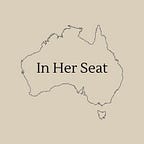Natalie Hutchins: Advancing equality
“Women having a voice means that more viewpoints are represented when decisions are made”
Almost 100 years ago, Edith Cowan became the first woman elected to an Australian parliament, in March 1921.
In Her Seat is asking as many currently serving female politicians as we can how they view gender equality, politics and their impact.
This is a non-partisan project that is soliciting contributions from women in all parties, or none at all, in every parliament.
Natalie Hutchins Member for Sydenha in the Victorian Legislative Assembly. She is the Minister for Victim Support, Corrections, Youth Justice and Crime Prevention.
Previously, Natalie was the Minister for Local Government, Aboriginal Affairs and Industrial Relations, as well as Minister for Women and for the Prevention of Family Violence.
Raised in Melbourne’s western suburbs, Natalie spent her youth combining studying with jobs like as a waitress, a dance teacher and a printer’s assistant.
After university, Natalie began working in the union movement. In 1996 she was the first woman to be elected as the assistant secretary of the Victorian Trades Hall Council, in the organisation’s 137-year history. In this job she played a prominent role in the 1998 waterfront dispute.
Natalie ran her own business immediately prior to joining parliament, consulting and researching on workplace issues and strategy.
What does gender equality mean to you?
I’m proud to be part of a government where half of our MPs and half of our cabinet are women.
Gender equality doesn’t end here though.
Women having a voice means that more viewpoints are represented when decisions are made — which means better decisions for women across everything the government does: for example giving women more opportunities through free TAFE; making sure occupations dominated by women like teaching and childcare are paid and treated well; ensuring women who suffer from family violence have support; and giving women better access to healthcare — like access to IVF and fertility treatment.
Which female politicians have inspired or encouraged you?
Julia Gillard has been a huge inspiration to me throughout my career.
Her fearless Misogyny Speech has inspired millions of women across the world — including me. While she was Prime Minister she also achieved so much for working Australians like progress on equality of education, access to healthcare and establishing the NDIS.
One of my fondest memories is meeting her when I was Minister for Local Government we opened the Julia Gillard Library (named after her!) together.
The other inspiration to me was Joan Kirner, the first woman Premier of Victoria.
What inspired you to serve your community?
I was born into a family with strong union values. My great-great grandfather, Hughie Sykes, was among the first members of the Waterside Workers Federation. His son George and his grandson George worked alongside him. The stories those men told were amazing — they fought for health and safety, superannuation and a liveable wage. This is why I joined the union movement and became the first woman elected as assistant secretary of Victorian Trades Hall Council.
From here I moved into Parliament to represent part of Melbourne’s Western suburbs close to my heart.
When I was a child, my parents moved us from high-rise public housing to the western suburbs for a better life.
Like many families, my parents made sacrifices to give their children better chances — it’s an honour to represent that area now.
What are the most important contributions you are making in Parliament?
As Minister for Women and Minister for Prevention of Family Violence I led the establishment of Respect Victoria and ensured women have an equal voice in everything it does, as well as many of the other recommendations of the Royal Commission into Family Violence.
As Minister for Aboriginal Affairs I worked with Aboriginal Victorians to establish Treaty in Victoria.
We are working together to create a better future for all Victorians and enable true self-determination for Aboriginal people.
Treaty has been a priority for Aboriginal Australians for a long time — I’m proud that our government has had a chance to finally make it a reality.
What is next for gender equality in politics?
I hope to see more action from other political parties to promote women. I’m proud to have helped push for Labor’s 50% target for women in parliament. Our political system is dominated by political parties so women cannot thrive if they are held back within those parties.
Those with power and influence within parties should take action to support women and promote them.
Across all parties, I hope that allegations of bullying and harassment are taken more seriously.
Reports of harassment and bullying in Canberra were met by powerful people — mainly men — trying to discredit women and keep their power. Women from all areas of politics deserve better.
In Her Seat interviews can be accessed here
